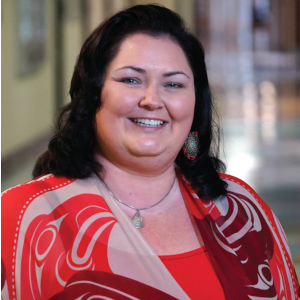Dr. Wendy Smythe Díi Hlanggwáay tla k_íiya ‘la áaygaagang: Fostering Inclusive Research and Education Practices From K-12 to Funding Agencies

Professional title
Assistant Professor
Bio
Wendy F. Smythe, PhD. is Alaska Native Haida from Hydaburg, Alaska. Her Haida name is K’ah Skaahluwaa, from the Xáadas (Haida) clan of Sdast’ aas (Fish egg house).
Dr. Smythe is an Assistant Professor at the University of Minnesota Duluth (UMD), she holds a joint appointment between the Departments of American Indian Studies and Earth & Environmental Sciences. She was named the 2019 Professional of the Year by the American Indian Science and Engineering Society (AISES) for her interdisciplinary research in geoscience, Native Education, and policy. In 2020 Dr. Smythe was elected to the AISES Board of Directors.
Prior to joining UMD in August 2019 she served as an Executive Branch AAAS Science & Technology Policy Fellow hosted by the National Science Foundation in the Directorates for Education & Human Resources and in the Directorate of Geoscience in the Division of Earth Science Systems for two years.
She is a geoscientist and oceanographer whose research focuses on examining microbial ecology and molecular diversity, biogeochemistry, and biomineralization in metalliferous, iron and manganese rich groundwater and marine ecosystems from deep-sea hydrothermal volcanoes to hydrothermal springs in Southeast Alaska and Yellowstone National Park. In addition, Dr. Smythe conducts research and training for geoscience faculty, researchers and federal agencies to gain a better understanding, appreciation and respect for diverse students, faculty, and communities, and is a signatory for the “Call to Action for an Anti-Racist Science Community from Geoscientists of Color (https://notimeforsilence.org).
Over the last 13 years Dr. Smythe has had the honor of partnering with her tribal community after founding The Haida Geoscience Education Program working to couple STEM disciplines with Traditional Knowledge in K-12 education by incorporating language and cultural values. She serves on the board of directors for the Xáadas Kil Kuyaas Foundation a 501 (C) 3 whose mission is to promote, preserve, and perpetuate the highly endangered Northern Haida language. Through her work, she seeks to increase the number of Native American- - Alaska Native students represented in STEM disciplines thereby increasing diversity and innovation, and to teach the next generation of Native leaders to embrace their Native identity.

